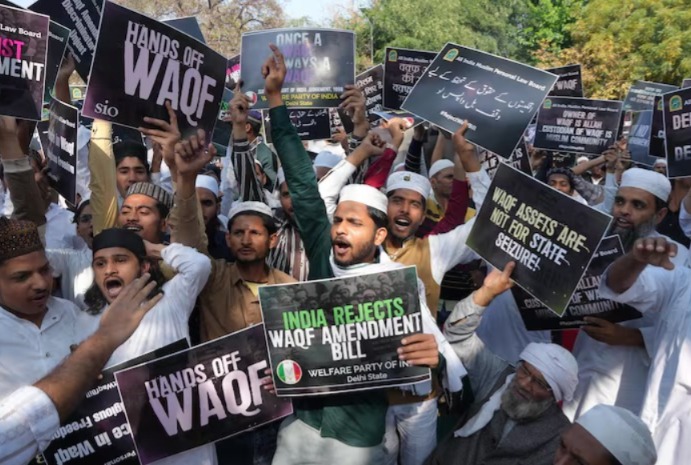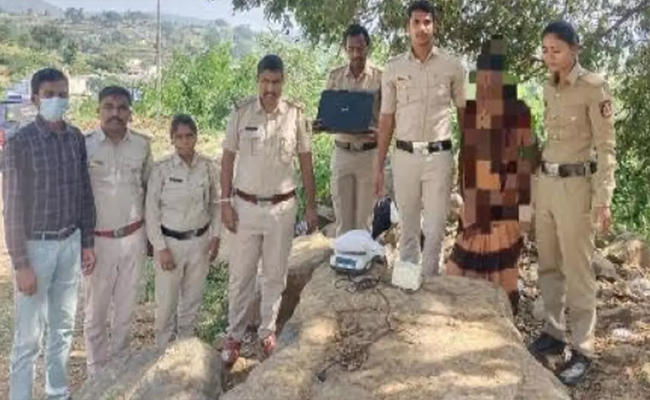New Delhi (PTI): The Centre has notified the Unified Waqf Management, Empowerment, Efficiency and Development Rules, 2025 that deal with issues such as the portal and database of Waqf properties, the manner of their registration, conduct of audit and maintenance of accounts.
The rules were notified on Thursday in exercise of powers under Section 108B of the 1995 Act, which was inserted through the Waqf (Amendment) Act 2025, which came into effect from April 8, 2025.
According to the rules, a portal and database is set up for the purposes of filing of details of Waqf, uploading the list of auqaf, registration of new Waqf, maintenance of register of auqaf and maintenance and submission of accounts of mutawalli of a Waqf, publication of audit report and proceedings and order board under Section 48 of the Act.
The joint secretary to the Government of India in the Ministry of Minority Affairs in-charge of the Waqf division shall be responsible for the supervision and control of the portal and database, the rules notified said.
The portal and database shall contain the details and fields referred to in the Act, monitoring and management of Waqf properties and related data, court cases, resolution of disputes and such other details and fields as are necessary for the filing of details of the Waqf and the property dedicated to it on the portal and database.
Every state government shall appoint an officer not below the rank of a joint secretary to that government as the nodal officer and shall establish a centralised support unit, in consultation with the central government for providing assistance in streamlining uploading of details of Waqf and properties thereof, registration, maintenance of accounts, audit and other related activities of the Waqf and the board, the rules stated.
The portal and database shall include features for real-time monitoring of registration of new Waqf and filing details of the Waqf and properties dedicated to the Waqf, institutional governance, court cases and dispute resolution, financial oversight and resource management, and for surveys and development thereof, the rules stated.
Every mutawalli shall enrol on the portal and database by using his mobile number and e-mail address through authentication by one-time password (OTP) received from the portal and database and thereafter be able to access the portal and database and file details of his Waqf and property dedicated to the Waqf.
After enrolment, the mutawalli shall be able to login the portal and database by using his mobile number and e-mail ID with OTP for future use of the portal and database in respect of his Waqf.
A mutawalli is the manager or administrator of a Waqf property, which is an Islamic charitable endowment.
Every user of the portal and database, including board, collector, designated officer under Section 3C of the Act, and other officers of the central government and state government dealing with Waqf shall also have access to the portal and database under this rule.
Central Waqf Council shall have access to the information uploaded on the portal and database.
As per the rules, after completion of survey, the state government shall publish the list of auqaf which shall contain the identification, boundaries of Waqf properties; their use and occupier; details of the creator, mode and date of such creation; purpose of Waqf; and their present mutawalli and management.
The state government shall ensure the notified list of auqaf and the details of each Waqf are uploaded on the portal and database within a period of 90 days from the date of publication of the list in the official gazette by an officer authorised by the state government.
If the notified list of auqaf and details of each Waqf could not be uploaded on the portal and database within the period specified under sub-rule (2), the state government shall upload the same within a further period of 90 days along with the reasons for the delay, the rules stated. A waqf created after the commencement of the Waqf (Amendment) Act, 2025 (14 of 2025) shall make an application to the board for its registration under Section 36 of the Act within three months of its creation, they said.
The application for registration of Waqf shall be made on the portal and database in Form 4, the rules said. The board shall maintain a register of auqaf under Section 37 of the Act in electronic mode on the portal and database in Form 5, they said.
On receipt of the audit report under sub-section (2) of Section 47 of the Act, the board shall publish the audit report on the portal and database, according to the rules.
Let the Truth be known. If you read VB and like VB, please be a VB Supporter and Help us deliver the Truth to one and all.
Bengaluru: Vidyaranyapura police have arrested four persons, including a man posing as a Police Sub-Inspector (PSI), for allegedly breaking into a house, threatening the occupants, and extorting money while wearing police uniforms.
The arrested accused have been identified as Mallikarjuna, Pramod, Vinay, and Hrithik.
Police said the accused had hatched a plan to pose as police personnel, conduct fake raids, and extort money from residents by intimidation.
ALSO READ: Bantwal police arrest two men for illegal sale of narcotics, seize two vehicles, 810 gm ganja
According to the police, Mallikarjuna had failed the PSI examination twice and later falsely projected himself as a PSI. He allegedly conducted photo shoots in his hometown, Siraguppa, wearing a police uniform, baton, cap, and shoes, claiming to be serving as a PSI in Bengaluru.
On December 7, the four accused allegedly went to the house of Naveen in the Vidyaranyapura limits, threatened him with a stick and an iron rod, and claimed they had information that he was selling ganja. Under the pretext of searching, they allegedly extorted ₹87,000 through bank transfer, ₹53,000 in cash kept in the house, and ₹2,000 from his wallet.
Following Naveen’s complaint, Vidyaranyapura police registered a case and launched an operation, leading to the arrest of all four accused. Police have seized ₹45,000 in cash and the car used to commit the crime.
Further investigation is underway.





